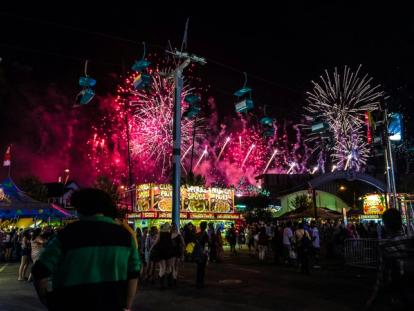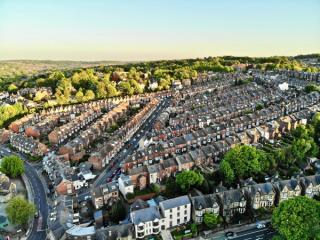
Sounds of the (temporarily) wild west: Calgary's noise bylaw and its Stampede exemptions
- Post Date
- 04 July 2024
- Read Time
- 6 minutes

Whether through increased stress, sleep disturbance, or even hearing loss, persistent exposure to loud noise can significantly impact health and well-being. As cities grow, effective management of noise from the community and local events becomes critical. In this article, we explore how the City of Calgary manages outdoor and environmental noise during the “greatest outdoor show on earth”, Calgary Stampede, and make recommendations for managing noise at similar events.
First, let’s go over what you need to know about Calgary’s noise Bylaw, with a particular focus on outdoor concerts, speakers, and notable exclusions for the Calgary Stampede.
Calgary’s Community Standards Bylaw
Calgary’s Community Standards Bylaw Number 32M2023 (the Bylaw) is the City’s primary tool for regulating local sound levels. Part 8 – Regulation of Noise of the Bylaw addresses a range of sound sources and potential points of reception.
Calgary’s noise Bylaw is intended to prevent objectionable noise from disturbing the public, especially during nighttime hours. The bylaw stipulates daytime and nighttime sound level limits within Calgary’s downtown, at non-residential developments and residential developments (which includes any land that is the site of a house, multi-family dwelling, housing project, apartment building, lodging house, senior citizen complex, or hospital).
More stringent sound level limits are typically established between 10 PM and 7 AM on weekdays and 10 PM and 9 AM on weekends and holidays. Additional considerations are identified for situations where the existing ambient sound levels are over the limits. Further specific sound level limits are defined for air conditioners, fans, central vacuum systems, or generators, as well as outdoor concerts.

Outdoor Concerts and Speaker Systems
The Bylaw establishes both A and C-weighted sound level limits at adjacent residential developments for outdoor concerts. The bylaw also prohibits operating an outdoor speaker system within 150 m of a residential property line from 10 PM to 7 AM.
Event planners and organizers must ensure that the sound level and event timing adhere to these defined restrictions to avoid potential penalties.
Major events (outdoor gatherings like concerts, festivals, sports events, performances, attractions, or similar occasions) may apply for an exemption permit if they are expecting to exceed the sound level limits. These permits typically come with specific guidelines and time restrictions to balance the interests of event organizers and nearby residents.
The Calgary Stampede
The Calgary Stampede, a ten-day event held every July, is one of the City's most iconic celebrations packed with events, concerts, fireworks, and pancake breakfasts. During this period, some aspects of the Bylaw are specifically relaxed without the need for an exemption permit to accommodate the festivities. These special accommodations include:
Sound Level Limits Exemptions: In particular, the activities of The Calgary Exhibition and Stampede Ltd. are exempt from the noise restrictions outlined under the Bylaw for the duration of the Calgary Stampede.
Extended Hours: For the Calgary Stampede's duration, the allowable operation of outdoor speakers within 150 m of a Residential Development is extended until midnight (2 hours later than the usual 10 PM cutoff). Venues can further apply for a noise exemption permit, and, if approved, can operate until 2 AM.

Tips and Tricks:
What To Do If You’re Bothered by Calgary Stampede Noise
As a resident, it’s best to stay informed about the City’s noise policies and legislation. To help further mitigate unwanted noise, you can:
- Use noise-cancelling headphones or earplugs (both to help you sleep and to protect your hearing while at an event).
- Play white noise/rainfall sounds in your home to mask and make exterior noise less intrusive.
- Close windows and spend time in rooms facing away from nearby events.
- Take a trip out of Calgary to somewhere peaceful.
- Join in on the action!
How to Be a Good Neighbour During the Calgary Stampede
As an event organizer, working within the Bylaw’s requirements and proactively engaging the community can often make all the difference in garnering a positive public reception to increased sound levels. To help further attenuate noise generated from concerts, speakers, and events, you can:
- Limit audio system sound levels and employ sound monitoring and measurements to understand, quantify, and adjust the sound levels being produced.
- Direct loudspeakers downwards and away from residents and look to decouple loudspeakers from structures.
- Minimize the use of subwoofers and explore lower power systems where possible.
- Limit full-band or drum and bass heavy performances.
- Employ temporary noise barriers, noise control curtains, heavy-duty tent fabrics, or get creative with hay bales (results may vary).
- Reduce openings on tents and other potential sound transmission paths toward adjacent sensitive receptors.
- Include absorptive acoustic treatment within the venue to reduce reverberant sound build up within the space.
- Close doors and consider sealed lobbies or vestibule configurations to limit sound egress.
- Provide advisory signage for patrons to minimize noise when on the streets and entering/leaving venues.
- Consider scheduling and event timing options to see if adjustments to less noise-sensitive times can be achieved.
- Provide staff training on noise so they’ll be aware of nearby residential receptors and the potential for complaints.
- Compensate adjacent and nearby residents with free tickets to events.
- Proactively engage the local community to help manage expectations.
Make Your Voice Heard
Noise bylaws, policies, and legislation often seek a balance between protecting residents from excessive noise while still accommodating a city’s dynamic growth and vibrant events.
Creating effective and enforceable policies is important for municipalities and local governments while understanding these regulations is crucial for developers, planners, and residents alike. Whether you're organizing a new event or just trying to enjoy a peaceful night at home, being aware of your city’s noise management framework can help create and maintain an acceptable acoustic environment in your community.
Do you have thoughts and ideas on how noise should be managed in Calgary moving forward? The Alberta Acoustics, Noise, and Vibration Society (AANViS) is seeking input on an Alberta Noise and Vibration Policy. Learn more, share your input, and join the conversation as described here. Your feedback is valuable in shaping the future of sound in our city.
Keeping the Beat Without Breaking the Bylaw: How We Can Help
Managing noise during events is an ongoing balancing act. While Calgary Stampede exemptions offer some flexibility, ensuring your event adheres to noise bylaws is crucial to avoid penalties and maintain a positive community relationship.
SLR’s team of experts offers noise emission investigations and consulting services. We can:
- Measure sound levels at your event location to ensure compliance with bylaws.
- Develop noise mitigation strategies to reduce sound levels at their source.
- Assist with noise exemption permit applications, if necessary.
- Provide ongoing monitoring and support to ensure your event runs smoothly and adheres to noise regulations.
Let's work together to keep the music playing and your neighbours happy.
Recent posts
-

-

Unlocking value through solar PV repowering: A focus on module replacement and DC/AC optimisation
by David Fernandez
View post -
